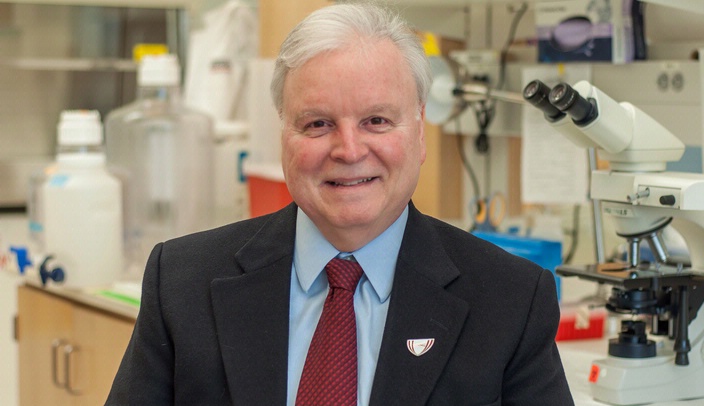UNMC College of Medicine faculty received nine awards during the month, bringing in $2.8 million in new funding. These awards included:
William Rizzo, M.D., pediatrics – pediatrics metabolism, received $900,000 from the National Institute of Child Health and Human Development. These funds continue the support for the Sterol and Isoprenoid Diseases Research Consortium (STAIR). This group investigates a collection of rare metabolic disorders caused by genetic defects that affect the synthesis of sterols and isoprinoid-related molecules.
Vimla Band, Ph.D., genetics cell biology & anatomy, received more than $500,000 through the U.S. Army’s Congressionally Directed Medical Research Programs. This award will support research into how a novel association between the overexpression of a cell cycle regulator and calcium signaling plays a role in the oncogenesis of certain breast cancers.
Guangshun Wang, Ph.D., pathology & microbiology, received $300,000 from the National Institute of Allergy and Infectious Diseases. This award will continue funding the development of an antimicrobial peptide database. This database supports the research of certain naturally-occuring peptides that are able to attack a variety of pathogens, including those that are resistant to current antibiotic therapies.
Industry-sponsored contracts:
The following industry-sponsored contracts and foundation grants also were received. Information on clinical trials enrolling patients at UNMC can be found here.
Diana Do, M.D., ophthalmology and visual sciences, is studying a novel treatment for patients with diabetic macular edema.
Edward O’Leary, M.D., internal medicine – cardiology, is the UNMC lead on a Phase III clinical trial to evaluate the use of a novel treatment in patients with atrial fibrillation who have also had a percutaneous coronary intervention.
Diana Florescu, M.D., internal medicine – infectious diseases, is the UNMC lead on a Phase III clinical trial to compare the safety and efficacy of using novel antibiotic combinations in patients with ventilated bacterial pneumonia and ventilated nosocomial pneumonia.
Jingwei Xie, Ph.D., surgery, is testing the use of different compositions of nanofibers as surgical mesh.
Samuel Cohen, M.D., Ph.D., pathology & microbiology, has received support from the Rice Foundation to study the mechanisms, dose response and thresholds of arsenic exposure as it pertains to cancer risks.
Paul Fey, Ph.D., pathology & microbiology, is continuing to test the reproducibility of a PCR-based technique for pathogen detection.
